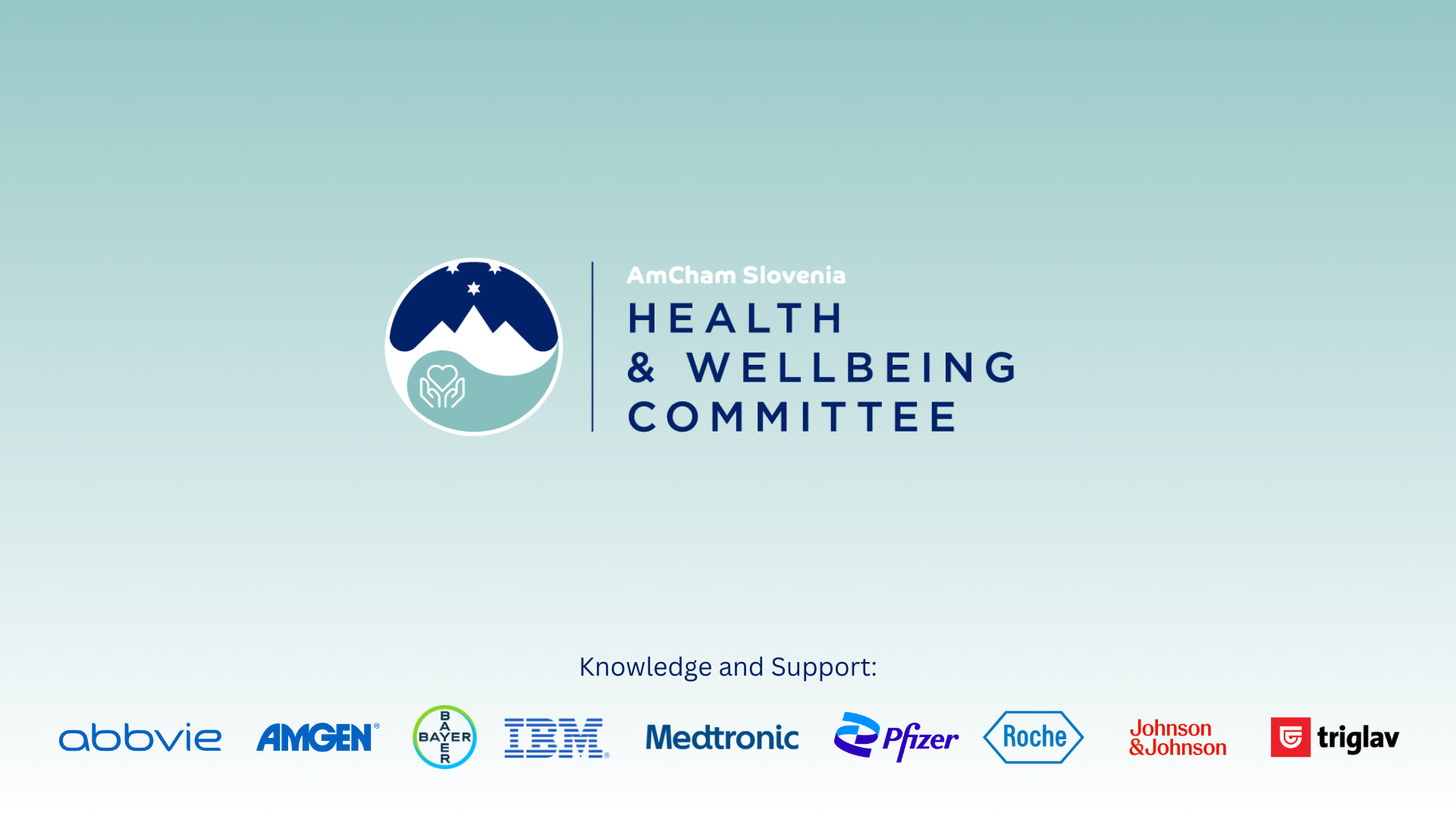The state will have to concentrate its efforts on citizens and consider all available opportunities. An area in urgent need of reform is the healthcare system, where our primary concern is in ensuring all Slovenian citizens have long-term access to first-rate healthcare services.

Key areas of the Committee’s work
Value-Based Healthcare and Quality Indicators
Value-based healthcare is an approach to healthcare provision that focuses on the treatment outcomes from diagnosis to care. At the same time, it optimizes the use of resources and the costs associated with the provision of healthcare. The goal is for healthcare to shift its focus from curing disease to actually addressing patient needs and focusing on prevention, per the modern 4P paradigm – predictive, preventive, personalized, and participatory. This also means a shift in accounting models since payment for services is based directly on the treatment results for the individual patient and not merely on the type and quantity of healthcare services provided. Payment is, therefore, based on treatment outcomes that are important to the individual patient, not on the quantity of healthcare services provided.
Another part of the patient-centered approach is the constant verification of the quality of services and individual patient safety. Specific quality indicators have been introduced in some areas. Data and analyses on the performance of individual providers are crucial for decision-makers and managers in the healthcare system and, of course, for those paying for healthcare services. Quality indicators are also vital for patients as they allow them to make better decisions about who to trust with their health. The results of quality indicator analyses must, therefore, be accessible to everyone.
Slovenia should be much more ambitious in terms of access to modern therapies and innovative drugs. Data (from the Patients W.A.I.T. indicator) shows that less than 50% of all medicines registered by the EMA in the last three years are available in Slovenia. In Germany, the figure is 96%. Rapid access to innovative medicines and therapies is an investment in the future and a key tool in fighting long-term chronic diseases, prolonged sick leave, and other drains on the economy that are a burden for society as a whole.
Positive and Long-Term Effects of Data-Driven Healthcare on the Healthcare System and the Use of Digital Technologies
Data-driven healthcare and the related introduction of modern approaches and digital technologies bring numerous advantages for all healthcare stakeholders since it improves the quality of patient care and the performance of healthcare workers, thus improving the functioning of the entire healthcare system. It also makes a significant contribution to the transparency of all processes.
The main reasons why data-driven healthcare and digitalization are important include:
-
Improved efficiency, quality, and accessibility of healthcare for patients;
-
Development and more efficient governance of the healthcare system. Modernization of processes, for example, reduces the time required for manual data processing and entry, which increases efficiency. Hospitals and clinics can use data-driven healthcare and the associated technology to improve supply management, patient monitoring, and operations planning;
-
Optimization of expenditure and reduction of costs of healthcare services. Digital medical records, for example, reduce the need for manual data entry, thus reducing the number of errors, while data is held in one place and accessible to healthcare personnel throughout the process;
-
Digitalization should improve not only the security and protection of healthcare data but also the subsequent use of data that has been appropriately prepared in accordance with legislation. The use of digital medical records and other electronic healthcare systems reduces the likelihood of the loss or theft of paper documents.
Modern Infrastructure and Equipment – Financing via a Public-Private Partnership
The public-private partnership (PPP) model addresses the planning, construction, financing, and management of a healthcare project. This usually means investment in healthcare infrastructure such as hospitals or state-of-the-art medical equipment. A key advantage of the PPP model is the optimal sharing of project risks between public and private partners, with each partner taking on the area of risk they can better manage.
Experience from abroad shows that PPP projects are more successful precisely because of the appropriate risk-sharing between the partners and the broader use of different expertise. Such projects are more development-oriented, involve more advanced treatment methods, and are more cost-effective. The PPP model brings both financial and non-financial benefits for the public sector since private companies can access advanced technologies more quickly due to easier access to financing.
Modern methods of treating patients involve interdisciplinary skills more than ever before. Since the development of medical treatments is associated with large financial investments, business and investment management skills and experience in applying advanced business practices are also becoming increasingly important. This very broad range of interdisciplinary knowledge is difficult to acquire within the current collective of healthcare institutions, so the PPP business model is an appropriate way to combine advanced medical treatment expertise with efficient business management methods.
Sustainable Financing Of the Healthcare System
Reforming the financing of the public healthcare system in Slovenia is an urgent priority that is linked to healthcare access. The Healthcare and Health Insurance Act (ZZVZZ-T), which introduces compulsory healthcare contributions in place of supplementary health insurance, is not the right direction for a reform of the healthcare system.
At the same time, we believe that the Act on Intervention Measures in the Field of Health, Labour and Social Affairs and Health-Related Content (ZIUZDS) adopted in December 2023 will have a negative impact on access to the latest innovative drugs and therapies for Slovenian patients.
Demographic changes are inevitable and part of our reality. Our aging society and the increasing number of chronic conditions mean that there is a greater need for advanced medicines, therapies, and treatments. If we wish to maintain access to innovative therapies, we need appropriate long-term planning of expenditure on innovative therapies and drugs. Above all, we must be aware that long-term investment in healthcare has an extremely positive socio-economic impact on society as a whole. We should not overlook the positive effect of innovative therapies on treatment outcomes and the overall savings in healthcare generated by integrated health and social care. The alternative is a future in which Slovenian patients are deprived of optimal forms of treatment and a threat to the quality of healthcare services, which are currently still at a level comparable to that of the most developed countries.
We support a change in the financing of the public healthcare system to include sources other than GDP. Decisions on financing should be based on credible macroeconomic studies and analyses. It should be remembered that every additional burden on the working population reduces the competitiveness of the Slovenian business environment, with significant and long-term multiplier effects. We cannot resolve the questions of healthcare financing through new taxes and burdens on the economy.
The thoughtful introduction of new forms of non-tax healthcare financing would preserve and continue to enable the introduction of innovative therapies and medicines and, thus, an advanced healthcare system. Systemic solutions and the introduction of various forms of individual and collective voluntary health insurance would relieve the burden on people. In the long term, the worrying rise of out-of-pocket payment, which creates a parallel market-based healthcare system, means that only those who can pay for healthcare would be able to afford it.
Corporate Governance and Competent Human Resources in Healthcare
A key challenge for the governance and management of hospitals and all healthcare providers is the legal system which does not allow for the introduction of modern business models. The present legal and formal arrangements, which are conditional on the status of a public institution, are rigid and unable to meet the challenges posed by progress in healthcare. The current situation hinders initiative, flexibility, the recruitment of staff, adaptation of individual organizations, and changes driven by specific characteristics and demographic and health trends. One sensible solution would be to connect all hospitals in a single system. This would positively impact the healthcare profession, management, and governance. The introduction of training systems that are tied to data-driven healthcare would also be beneficial. Supervision of the system would be the responsibility of the Ministry of Health.
Another challenge relates to the expectations of stakeholders in the healthcare system. Management should not only focus on the number of services provided but also on efficiency and quality, which are linked to the satisfaction of patients and employees. This requires a constant updating of the healthcare work and processes organization. With all business and clinical processes centered on the patient and their experience, people will be at the heart of the system, which will then function sustainably, affordably, and with solidarity.
Encouraging Citizens to Take Responsibility for Their Own Health
Encouraging citizens to take responsibility for their own health, together with prevention programs, plays a key role in creating a healthier society. Research shows that 90% of premature deaths in the EU are the result of poor systemic care in the area of prevention. It is, therefore, essential to establish effective public health approaches that encourage harm reduction and promote healthier lifestyles.
Another provision related to the inadequate systemic promotion of healthy lifestyles is the extension of the period during which the employer covers sick pay to 30 days. This is a provision that representatives of the business sector find difficult to accept. Such a measure leads to additional financial burdens on the business sector, which is not sustainable. It is important to establish active dialogue involving the government, employers, and citizens, as well as seek solutions that will promote a responsible attitude towards health.
The principle of harm reduction is already being used successfully in a number of EU countries to help manage non-communicable chronic diseases (e.g., diabetes) and harmful behaviors (smoking, sunbathing, etc.). This approach not only advocates the elimination of harmful habits but also encourages the use of alternative, scientifically proven approaches and alternative products that replace harmful lifestyle choices with less harmful ones.
Healthcare in critical situations
The expectations of all stakeholders in healthcare – patients, service providers, and payers alike – are justifiably ever greater.
Attention must not be focused only on the number of services provided but also on their efficiency and quality and the satisfaction of patients and those employed in healthcare. The COVID-19 pandemic has shown how important it is to transform how healthcare works.This situation has shown the good will and devotion of all medical staff, and at the same time uncovered procedural bottlenecks that must be effectively overcome so as to support everyone: doctors, staff and patients. It is important that the healthcare system open up to new organizational approaches, the so-called “harm reduction” approaches, and the introduction of innovations and digital tools, which increase the accessibility and efficiency of diagnostics and treatment.
The future of medicine is now
Introducing innovations in healthcare
When introducing innovations and innovative operational models (HTA) we recommend forming an independent group of experts to act independently, yet in agreement with Slovenia’s Ministry of Health, the Slovenian Society for Medical Informatics (SDMI), and the Agency for Medicinal Products and Medical Devices of the Republic of Slovenia, linking with the international network of HTA agencies.
Digitalization of healthcare
The COVID-19 situation has shown the significance of enabling patients to access information about their health (e.g. via mobile devices) with pertinent advice for a quicker recovery, control, and general accessibility. Digital information technologies ensure increased efficiency and quality with better integration of all sources of patient treatment and care.
They make “e-health” possible, including online information, illness management, remote monitoring, and telemedicine, all of which increase the scope of limited healthcare sources and knowledge.With the help of artificial intelligence, the diagnostics and subsequently treatment are of a higher quality and data-driven, while doctors’ work is more efficient. The faster and safer handling of patients creates better capacities due to more efficient processes, and control over costs is maintained. Telemedicine is an important complementary system, which enables access to suitable and timely information for ensuring optimal care.
Personalized medicine
Personalized medicine is the concept of the right form of care for the right patient at the right time. This concept builds on a paradigm that distances itself from an approach that assumes that one form of treatment suits everyone. Traditionally, personalized medicine refers to diagnostic methods used to recognize the characteristics of an illness. It also means the target medicines that aim directly at the changes recognized at the level of an individual’s molecular characteristics, and in this way ensure better results for the individual patient. Through the collection, advanced analysis, and linking of health data, and the development of digital tools that connect the patient and the doctor, we enable an optimal choice of treatment for the individual, the monitoring of an individual’s illness and the adaptation of treatment to achieve optimal results.

Who are the members of the Committee?
See the full list of Committee members.
Join the AmCham Health and Wellbeing Committee
For all questions related to the Committee’s work, you can turn to our Committee coordinator Vida Dolenc Pogačnik, our COO and International Cooperation Director.

Vida Dolenc Pogačnik
COO and International Cooperation Director

